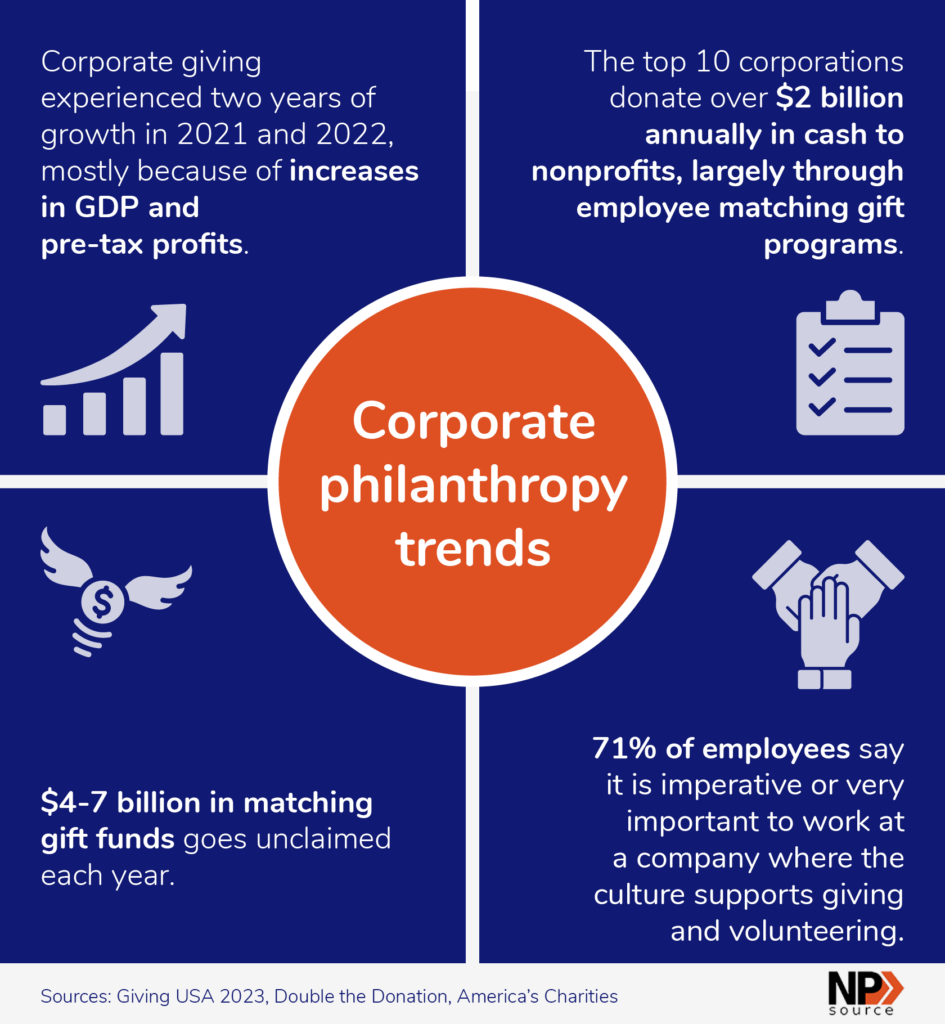Exploring How Business Philanthropy Shapes Brand Name Reputation and Consumer Commitment
Company philanthropy substantially affects brand reputation and consumer commitment. Companies that participate in authentic charitable campaigns often see a favorable shift in just how consumers perceive them. This placement of values cultivates trust and psychological connections with target markets. Nevertheless, the effectiveness of these humanitarian efforts can differ significantly. Comprehending what truly reverberates with consumers is important for brand names seeking to improve their social impact and market setting. What strategies will emerge as important for future success?
The Advancement of Corporate Philanthropy
As services increasingly acknowledge their duty in society, the development of company philanthropy has actually transformed from simple philanthropic donations to a calculated part of brand identification. At first, firms took part in philanthropy mainly for tax obligation advantages or to boost their public image. Over time, this strategy shifted as stakeholders-- including financiers, workers, and clients-- demanded a much more genuine commitment to social obligation.
Organizations started straightening their kind campaigns with their core worths and organization purposes, bring about even more thoughtful and impactful contributions. This change has actually motivated business to spend in lasting techniques and area growth, cultivating a feeling of objective that reverberates with customers.
Technological developments have facilitated openness and interaction, enabling businesses to display their humanitarian efforts much more effectively. Subsequently, company philanthropy has become an integral component of organization strategy, with organizations welcoming the chance to positively affect society while boosting their total brand name narrative.
The Impact of Philanthropy on Brand Name Perception
While firms engage in philanthropic initiatives to promote social great, these initiatives considerably shape brand assumption among customers. Business philanthropy can boost a brand's picture by associating it with positive social influence and community participation. Consumers usually perceive brand names that proactively take part in philanthropic activities as more trustworthy and liable. This perception can influence investing in decisions, as customers might prefer brands that show a dedication to social issues.

Structure Emotional Links Via Granting
Corporate philanthropy functions as a powerful tool for enhancing brand identity by linking business values with neighborhood requirements. With calculated giving, business can promote neighborhood interaction and produce shared values that resonate with consumers on a psychological level. This strategy not just strengthens brand credibility but likewise develops enduring connections between companies and their stakeholders.
Enhancing Brand Identity
They not only contribute to social excellent however also forge much deeper psychological links with their audiences when firms engage in kind initiatives. By aligning their brand name with charitable reasons, companies improve their identity and signal worths that resonate with consumers. This placement produces a narrative that exceeds solutions and items, inviting consumers to take part in a shared goal. As consumers progressively focus on purpose-driven brands, companies that proactively participate in offering can differentiate themselves in a congested market. Such initiatives cultivate a sense of commitment among customers who really feel personally attached to the brand's worths. Ultimately, company philanthropy ends up being an important device for enhancing brand name identity, growing long lasting partnerships based on common beliefs and psychological involvement.
Fostering Neighborhood Interaction
Countless research studies show that business participating in community-focused philanthropic efforts can considerably reinforce emotional connections with their stakeholders. By purchasing local jobs and sustaining social causes, services grow a sense of belonging and count on within the community. This interaction cultivates a favorable brand picture, as consumers value companies that demonstrate authentic problem for societal problems. In addition, employees typically really feel extra motivated and happy to be linked with an organization that prioritizes neighborhood welfare. As a result, consumers are more probable to develop loyalty towards brands that proactively add to purposeful reasons. Inevitably, cultivating area involvement via philanthropy not just boosts brand name track record however likewise develops long lasting emotional ties that benefit both the area and the business it serves.
Producing Shared Worths
Just how can organizations effectively develop common worths that resonate with their stakeholders? Companies can attain this by straightening their humanitarian efforts with their core mission and the interests of their areas. By taking part in campaigns that resolve regional requirements, businesses foster psychological connections with consumers, boosting brand loyalty. Partnering with non-profits that mirror shared values strengthens the brand name's image and shows commitment to social duty. Furthermore, transparent interaction about these efforts allows stakeholders to see the substantial impact of their payments. Inevitably, by incorporating shared worths into their corporate philanthropy, firms not only enhance their reputations however also grow lasting partnerships with clients, resulting in boosted loyalty and depend on. This alignment is necessary in modern customer decision-making.
Case Studies: Effective Philanthropic Campaigns
Taking a look at effective philanthropic projects reveals different approaches that enhance brand online reputation. Impactful community campaigns, cutting-edge partnership designs, and lasting engagement methods have actually proven efficient in promoting favorable connections with consumers. These situation researches highlight the significance of thoughtful corporate providing in attaining both social and business purposes.
Impactful Community Initiatives
Numerous business have effectively leveraged kind projects to boost their brand credibility while making a significant influence in their communities. For example, a modern technology company released an electronic proficiency program in underserved neighborhoods, providing training and resources that encouraged neighborhood residents. This initiative not only added to community development yet likewise positioned the business as a socially responsible leader. Similarly, a major food company applied a cravings alleviation project, partnering with local nonprofits to distribute meals to family members in demand. This effort strengthened area connections and promoted customer commitment. With these impactful efforts, companies have actually demonstrated their commitment to social duty, successfully aligning their brand worths with the requirements of the communities they offer, you can try this out eventually enhancing their total track record.
Innovative Collaboration Designs
The success of impactful community campaigns typically hinges on cutting-edge partnership versions that combine varied stakeholders to deal with complex social obstacles. Situation researches show just how companies, non-profits, and government entities can work together efficiently. A multinational company partnered with a neighborhood non-profit to introduce an education and learning program, pooling sources and proficiency to boost community literacy rates. Another instance involved a tech business and a medical care organization joining pressures to create a telemedicine option for underserved populations. These partnerships not just intensified the reach of philanthropic efforts however additionally reinforced the brands' track records by straightening their missions with neighborhood requirements. Inevitably, cutting-edge partnership models serve as a driver for purposeful change and foster stronger connections between brands and their consumers.
Long-lasting Involvement Approaches

Determining the ROI of Corporate Social Duty
As firms progressively invest in company social obligation (CSR) initiatives, recognizing the return on investment (ROI) related to these initiatives ends up being essential. Gauging ROI in CSR is multifaceted, typically encompassing both qualitative and measurable metrics. Monetary returns can be analyzed via increased sales, boosted brand commitment, and improved employee spirits, which can cause higher performance. Additionally, companies might analyze price savings connected to lasting methods, such as lowered waste or energy intake.
Qualitatively, the impact of CSR on brand name credibility can be evaluated with customer perception researches and social media belief analysis. Studies can provide understandings into just how CSR activities influence consumer commitment and trust fund. Benchmarking versus sector standards can assist companies evaluate their CSR efficiency - corporate philanthropy. Inevitably, a comprehensive technique to gauging ROI enables companies to make educated choices concerning future CSR financial investments, aligning techniques with both monetary efficiency and social influence
Customer Assumptions and Company Responsibility
Increasingly, consumers expect business to operate with a solid sense of business obligation, checking out moral techniques as a requirement for brand name commitment. This change in assumption shows a growing understanding of social and ecological problems, leading clients to favor brands that align with their values. Customers are much more likely to sustain business that participate in transparent methods, demonstrate sustainability, and contribute favorably to their areas.
Social media intensifies these assumptions, allowing customers to share their viewpoints and experiences promptly. Discover More Here Brands that fail to satisfy these ethical criteria risk reaction, while those that welcome company obligation frequently enjoy superior credibility and consumer loyalty. As customers demand liability, business must integrate company social obligation right into their core approaches, prioritizing moral behavior not equally as an advertising approach, but as a basic aspect of their operations. This placement can ultimately cause stronger brand name affinity and sustained success in open markets.
Future Trends in Business Philanthropy and Brand Name Loyalty
The landscape of business philanthropy is advancing, influenced by the increased customer assumptions surrounding company responsibility. Business are significantly incorporating social impact into their core service strategies, not merely as a supplementary task. Future fads indicate a shift towards openness, with brand names sharing detailed info regarding their kind campaigns and their direct effects on communities.
Innovation is playing a vital duty, making it possible for real-time involvement in between brands and customers. Social media site systems assist in straight interaction, enabling consumers to voice their expectations and hold brands responsible. In addition, more youthful generations, specifically Millennials and Gen Z, focus on sustainability and honest methods, driving companies to embrace more conscientious strategies.
As company philanthropy comes to be associated with brand identity, companies that authentically straighten their goals with social requirements are likely to cultivate more powerful client loyalty. This merging of worths will eventually shape the future of corporate online reputation and customer connections in an increasingly diligent market.
Often Asked Questions
Just How Do Consumers Discover a Business's Philanthropic Initiatives?
Customers find a company's kind efforts through numerous channels, consisting of social networks, news release, area events, and word-of-mouth. These methods help with recognition, making it possible for individuals to involve with brands that line up with their passions and values.
What Function Does Employee Participation Play in Corporate Philanthropy?
Staff member involvement in company philanthropy boosts engagement, cultivates a sense of possession, and reinforces group communication - corporate philanthropy. This involvement frequently intensifies the impact of philanthropic initiatives, causing greater understanding and assistance for the company's kind initiatives
Can Corporate Philanthropy Backfire on a Brand's Online reputation?
If viewed as opportunistic or insincere, corporate philanthropy can indeed backfire on a brand's online reputation. Adverse public perception might develop, resulting in diminished trust and loyalty amongst consumers that focus on authenticity in corporate actions.
Are Smaller Firms as Reliable in Philanthropy as Larger Corporations?
Smaller companies can be similarly efficient in philanthropy as bigger firms, frequently demonstrating dexterity and credibility. Their local initiatives read more might reverberate extra deeply with areas, cultivating genuine connections despite limited sources contrasted to their bigger equivalents.
Just How Can Firms Pick the Right Creates to Assistance?
Firms can pick the ideal reasons by straightening their worths with area demands, assessing stakeholder passions, and reviewing possible effect. This calculated technique promotes authenticity, enhances engagement, and reinforces links with clients and the more comprehensive neighborhood.
While business engage in philanthropic initiatives to advertise social great, these initiatives greatly form brand name understanding among customers. As consumers increasingly prioritize purpose-driven brand names, business that actively involve in providing can differentiate themselves in a crowded market. Several business have successfully leveraged kind projects to enhance their brand online reputation while making a purposeful impact in their communities. Progressively, consumers anticipate business to run with a solid sense of company responsibility, watching honest practices as a requirement for brand commitment. As business philanthropy becomes associated with brand identification, companies that authentically straighten their missions with societal needs are likely to cultivate stronger consumer loyalty.